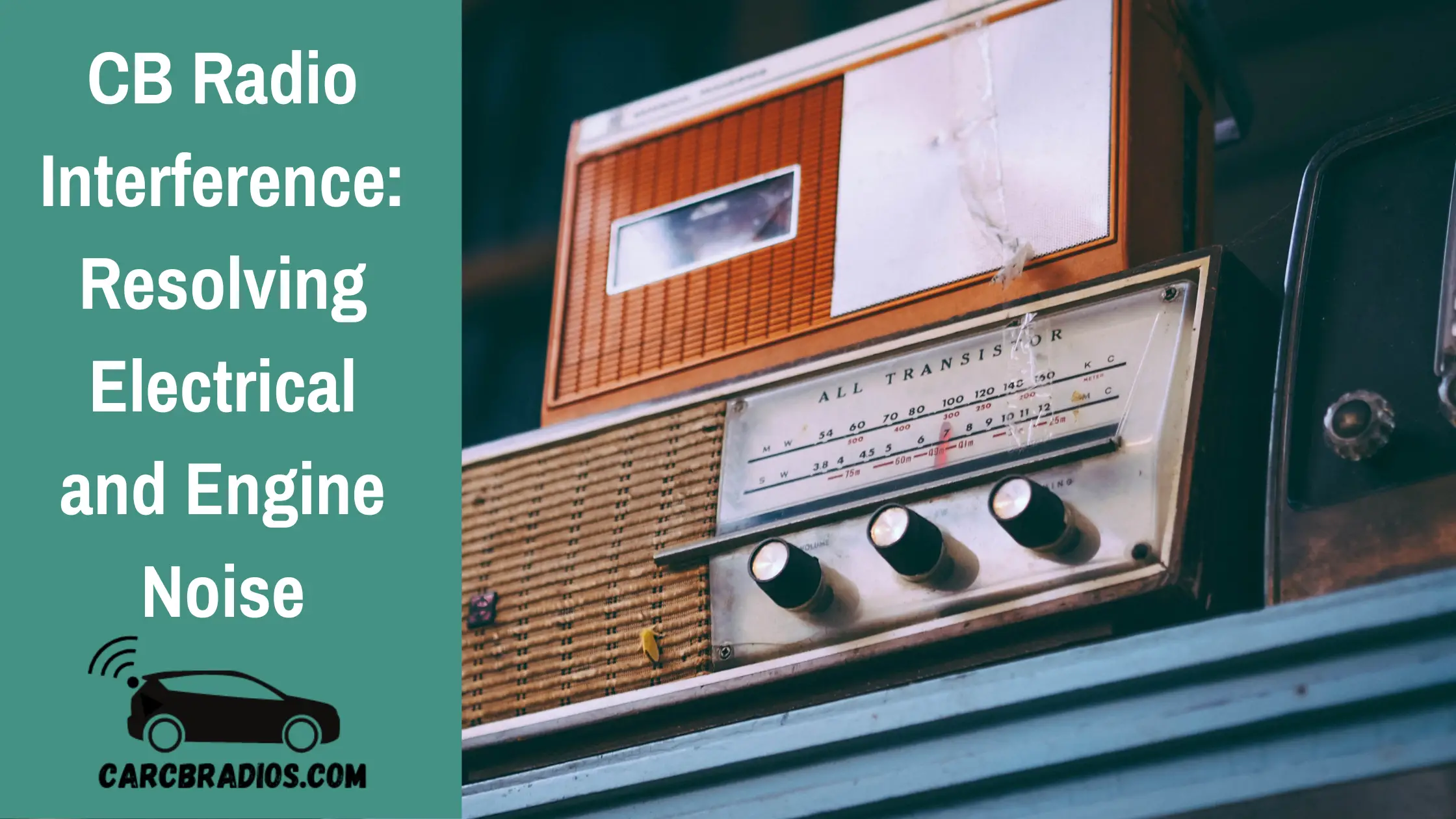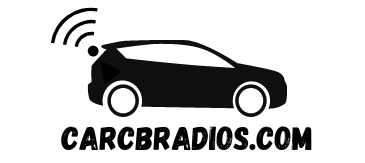By: Jeremy Neisser
CB radios have been a popular means of communication for truckers, off-roaders, and other enthusiasts for decades. However, interference can be a common problem that can make communication difficult or even impossible. Two of the most common types of interference are electrical noise and engine noise.
Electrical noise can occur when the CB radio's power source is not properly grounded or shielded. This can cause a buzzing or humming sound that can make it difficult to hear or understand transmissions. Engine noise, on the other hand, is caused by the electrical interference generated by the vehicle's ignition system. This can result in a high-pitched whine or static that can also make communication difficult.
Key Takeaways
Electrical noise and engine noise are common types of interference that can affect CB radio communication.
Electrical noise is caused by improper grounding or shielding, while engine noise is caused by the vehicle's ignition system.
Mitigation techniques for electrical noise and engine noise include proper grounding and shielding, installing noise filters, and using high-quality coaxial cables.
Understanding CB Radio
CB radio, also known as Citizens' Band radio, is a two-way radio communication system that operates on a set of 40 channels within the 27 MHz band. It is a popular communication tool for truckers, off-roaders, and other outdoor enthusiasts.
CB radios are designed to transmit and receive short-range signals, typically up to 10 miles or less. They are limited in power output to 4 watts, which helps to prevent interference with other radio services.
Using a CB radio requires a basic understanding of the channels and how to tune the radio to the desired channel. Each channel has a specific frequency and purpose, such as channel 19 being used for trucker communication.
When communicating on a CB radio, it is important to follow proper etiquette, such as identifying yourself with a handle or nickname and using clear and concise language.
CB radio can be a useful tool for communication, but it is important to be aware of potential interference from electrical and engine noise. This interference can cause static and distortion on the radio signal, making it difficult to communicate effectively.
In the next section, we will discuss common sources of CB radio interference and how to minimize their impact on your communication.
Electrical Noise: Causes and Effects
Electrical noise is a common problem that affects CB radios and other electronic devices. This type of noise is caused by electromagnetic interference (EMI) from various sources such as power lines, motors, and other electrical equipment. Electrical noise can have a significant impact on the quality of CB radio communication, making it difficult to hear and understand the messages being transmitted.
One of the main causes of electrical noise is power lines. High voltage power lines generate strong electromagnetic fields that can interfere with CB radio signals. The closer the power lines are to the CB radio, the stronger the interference will be. Other sources of electrical noise include motors, generators, and other electrical equipment that generate electromagnetic fields.
The effects of electrical noise on CB radio communication can be significant. Electrical noise can cause static, distortion, and other types of interference that can make it difficult to hear and understand the messages being transmitted. In some cases, electrical noise can completely disrupt CB radio communication, making it impossible to communicate effectively.
To reduce the effects of electrical noise on CB radio communication, it is important to minimize the sources of interference. This can be done by keeping the CB radio as far away from electrical equipment as possible. Additionally, shielding the CB radio and its antenna can help to reduce the impact of electrical noise.
In conclusion, electrical noise is a common problem that affects CB radio communication. It is caused by electromagnetic interference from various sources, including power lines and other electrical equipment. To minimize the effects of electrical noise on CB radio communication, it is important to reduce the sources of interference and shield the CB radio and its antenna.
Engine Noise: Causes and Effects
As a CB radio user, engine noise can be a frustrating interference that can make communication difficult. In this section, I will discuss the causes and effects of engine noise and how it can be mitigated.
Causes of Engine Noise
Engine noise is caused by electrical interference from the vehicle's ignition system. This interference can be generated by the spark plugs, distributor, alternator, or any other component that generates electrical energy. The noise is then picked up by the CB radio's antenna and amplified, resulting in a loud, static-filled transmission.
Effects of Engine Noise
The effects of engine noise on CB radio communication can be significant. The noise can make it difficult to hear incoming transmissions and can also interfere with outgoing transmissions. This interference can be particularly problematic in noisy environments, such as on the highway or in a busy city.
Mitigating Engine Noise
There are several steps that can be taken to mitigate engine noise. One approach is to install a noise filter or suppressor between the CB radio and the vehicle's power source. This will help to filter out unwanted electrical noise and improve the clarity of transmissions.
Another approach is to ensure that the CB radio is grounded properly. A poor ground can contribute to electrical interference and increase the amount of engine noise that is picked up by the antenna.
Finally, it is important to ensure that all components of the vehicle's ignition system are in good working order. Regular maintenance and replacement of worn components can help to reduce the amount of electrical interference generated by the system.
In conclusion, engine noise is a common interference that can make CB radio communication difficult. By understanding the causes and effects of engine noise and taking steps to mitigate it, users can improve the clarity of their transmissions and enjoy more effective communication.
Identifying Interference Sources
When dealing with CB radio interference, the first step is to identify the source of the problem. In my experience, the two most common sources of interference are electrical noise and engine noise.
Electrical Noise
Electrical noise is caused by other electrical devices in the vicinity of your CB radio. This can include anything from power lines to fluorescent lights to electronic devices like computers and televisions. Electrical noise can be identified by the distinctive buzzing or humming sound that it produces.
To identify the source of electrical noise, you can try turning off other electrical devices in the area one by one. If the noise stops when a particular device is turned off, then that device is likely the source of the interference.
Engine Noise
Engine noise is caused by the electrical system of your vehicle. This can include anything from the alternator to the spark plugs to the ignition system. Engine noise can be identified by the distinctive whining or clicking sound that it produces.
To identify the source of engine noise, you can try turning off the engine and seeing if the noise stops. If the noise stops when the engine is turned off, then the electrical system of your vehicle is likely the source of the interference.
Overall, identifying the source of interference is the first step in solving the problem. Once you have identified the source, you can take steps to eliminate or reduce the interference.
Mitigation Techniques for Electrical Noise
To mitigate electrical noise in CB radio transmissions, I recommend the following techniques:
Grounding: Proper grounding of the CB radio and all its components is essential in reducing electrical noise. Ensure that all components are grounded to the same point, and the grounding wire is as short as possible.
Power Filtering: Use a power filter to eliminate electrical noise from the power source. A power filter is a device that filters out unwanted noise from the power supply. It is installed between the power source and the CB radio.
Shielding: Shielding is a technique used to protect the CB radio from electrical noise. Use shielding materials to cover the CB radio and its components. Shielding materials can be made of copper, aluminum, or other conductive materials.
Twisted Pair Wiring: Twisted pair wiring is a technique used to reduce electrical noise in the wiring. It involves twisting two wires together to reduce the electromagnetic interference.
Ferrite Beads: Ferrite beads are small, cylindrical beads made of ferrite material. They are used to suppress high-frequency noise in the wiring. Install ferrite beads on the power and audio wires to reduce electrical noise.
Proper Grounding of Antenna: Proper grounding of the antenna is essential in reducing electrical noise. Ensure that the antenna is grounded to the same point as the CB radio.
By implementing these mitigation techniques, you can significantly reduce electrical noise in your CB radio transmissions.
Mitigation Techniques for Engine Noise
As I mentioned earlier, engine noise can be a major source of interference on CB radios. However, there are a few techniques that can help mitigate this problem.
One of the most effective ways to reduce engine noise is to use a noise filter. These filters work by blocking out unwanted frequencies and allowing only the desired signals to pass through. They can be installed between the radio and the power source, or directly on the power source itself.
Another technique is to use shielded cables. These cables have a layer of insulation that helps to reduce the amount of interference that is picked up by the cable. This can be particularly effective when used in conjunction with a noise filter.
It's also important to ensure that your radio is properly grounded. A good ground connection can help to reduce the amount of interference that is picked up by the radio. This can be achieved by connecting the radio to a metal part of the vehicle, such as the chassis.
Finally, you may want to consider relocating your radio to a different part of the vehicle. In some cases, simply moving the radio away from the engine can help to reduce the amount of interference that is picked up.
By implementing these techniques, you can significantly reduce the amount of engine noise that is picked up by your CB radio.
Preventive Measures
To minimize the electrical and engine noise interference on your CB radio, there are several preventive measures you can take. Here are a few:
Proper grounding: Ensure that your CB radio's ground wire is connected to a clean, bare metal surface on your vehicle's frame. This will help reduce the electrical noise interference.
Use a noise filter: Install a noise filter between your CB radio and the power source. This will help reduce the electrical noise interference caused by the vehicle's electrical system.
Check your antenna: Make sure your antenna is properly installed and grounded. A poorly installed or grounded antenna can cause engine noise interference.
Use shielded coaxial cable: Use a shielded coaxial cable to connect your CB radio to the antenna. This will help reduce the electrical noise interference.
Keep your CB radio away from electrical sources: Keep your CB radio away from other electrical sources in your vehicle. This includes your vehicle's ignition system, alternator, and other electrical components.
By taking these preventive measures, you can reduce the electrical and engine noise interference on your CB radio and enjoy clearer communication with other CB radio users.
Troubleshooting Common Problems
When it comes to CB radio interference, electrical and engine noise are two of the most common problems that users encounter. Fortunately, there are several troubleshooting steps that you can take to identify and resolve these issues.
First, if you're experiencing electrical noise, check to make sure that your power source is clean and stable. A dirty or unstable power source can cause interference that can be difficult to diagnose. You may also want to check your grounding to ensure that it's properly connected and that there's no corrosion or other damage.
If your power source and grounding are both in good condition, the next step is to check your antenna. A poorly tuned or damaged antenna can also cause electrical noise. Check your antenna for any signs of damage or wear, and make sure that it's properly tuned to the correct frequency.
If you're still experiencing electrical noise after checking your power source and antenna, the problem may be with your radio itself. Check your radio's wiring and connections to ensure that everything is properly connected and that there's no damage or corrosion. You may also want to consider upgrading to a higher-quality radio that's better shielded against interference.
When it comes to engine noise, the first step is to check your vehicle's electrical system. Make sure that your battery is in good condition and that your alternator is properly charging it. You may also want to check your spark plugs and ignition system to ensure that they're properly tuned and that there's no damage or wear.
If your vehicle's electrical system is in good condition, the next step is to check your antenna and radio. Follow the same steps as you would for electrical noise, checking your antenna for damage and tuning, and checking your radio's wiring and connections.
In some cases, engine noise may be caused by a faulty ground. Check your vehicle's grounding to ensure that it's properly connected and that there's no corrosion or other damage. You may also want to consider adding additional grounding straps to improve your vehicle's grounding.
By following these troubleshooting steps, you can identify and resolve common CB radio interference problems caused by electrical and engine noise.
Conclusion
In conclusion, electrical and engine noise can significantly impact CB radio transmissions. It is important to understand the sources of interference and take appropriate measures to minimize their effects.
Through my research, I have found that the most common sources of electrical and engine noise include ignition systems, alternators, and power inverters. These components can generate a wide range of frequencies that can interfere with CB radio transmissions.
To mitigate these effects, it is recommended to use high-quality coaxial cables, grounding systems, and noise filters. These components can help to reduce the amount of interference that is picked up by the CB radio. Additionally, it is important to ensure that all electrical connections are secure and free from corrosion.
It is also important to note that not all interference can be eliminated. In some cases, it may be necessary to adjust the location of the CB radio or the antenna to minimize the effects of interference.
Overall, by understanding the sources of electrical and engine noise and taking appropriate measures to minimize their effects, CB radio users can enjoy clearer and more reliable transmissions.
Frequently Asked Questions
How can I eliminate engine noise from my CB radio?
If you're experiencing engine noise on your CB radio, there are a few things you can try to eliminate it. First, make sure your antenna is properly grounded. You can also try adding an alternator noise filter or an RF noise suppressor to your setup. If all else fails, you may need to move your CB radio further away from your engine.
What is an alternator noise filter and how does it work?
An alternator noise filter is a device that helps eliminate electrical interference caused by your vehicle's alternator. It works by filtering out the noise before it reaches your CB radio. To install an alternator noise filter, simply connect it between your alternator and your CB radio.
What causes interference on CB radios?
Interference on CB radios can be caused by a variety of factors, including electrical interference from your vehicle's alternator, RF interference from nearby electronics, and even atmospheric conditions like thunderstorms.
How can I reduce static noise on my CB radio?
To reduce static noise on your CB radio, try adjusting your squelch control. You can also try moving your CB radio to a different location or adjusting your antenna. If you're still experiencing static, you may need to invest in a noise-cancelling microphone or an RF noise suppressor.
What is an RF noise suppressor and how does it work?
An RF noise suppressor is a device that helps eliminate RF interference on your CB radio. It works by filtering out unwanted signals before they reach your CB radio. To install an RF noise suppressor, simply connect it between your CB radio and your antenna.
Can CB radio interference affect speakers?
Yes, CB radio interference can affect speakers. If you're experiencing interference on your speakers, try moving your CB radio further away from your speakers or installing an RF noise suppressor.

Hi & Welcome!
My name is Jeremy and I have been an avid car nut for many year. My first car was an 1987 Honda CRX. I put in my first Kenwood stereo, amp, 2 10" JLs and a CB Radio in it and have been an avid user of CBs and car radios for years. I'll do my best to share my tips, information and thoughts to help you with whatever question you might have, ABOUT ME
After I graduated from High School, I worked 5 years are Radio Shack and 3 years at Circuit City answering questions and helping customers with various electronics questions.

